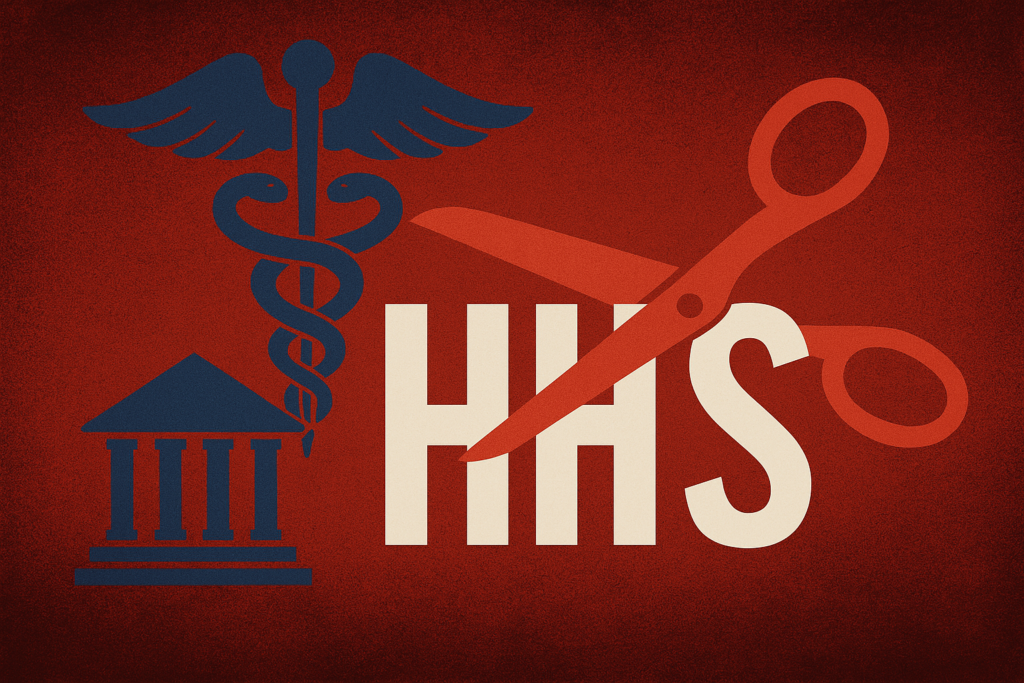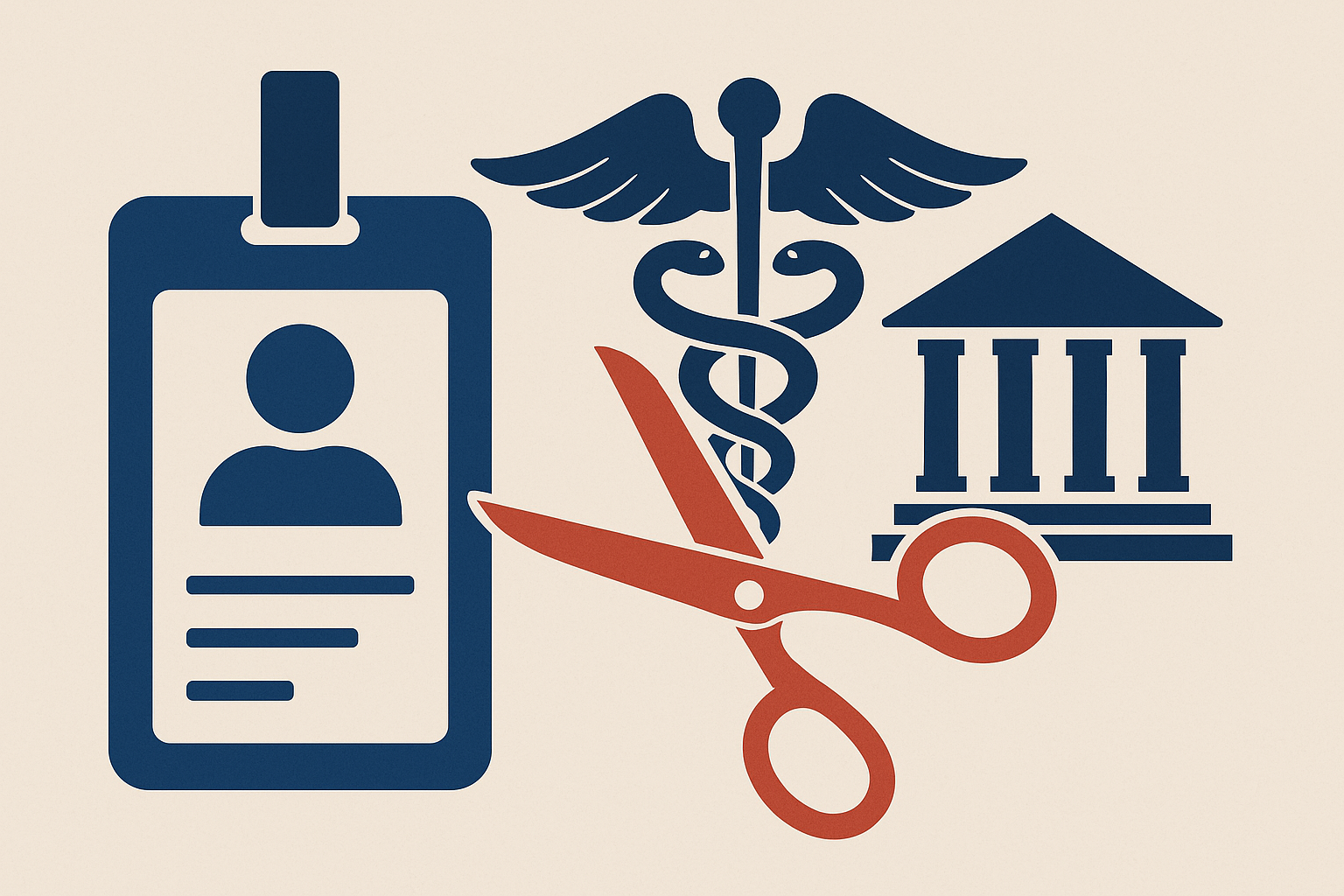The U.S. Department of Health and Human Services (HHS) announced sweeping changes on Thursday, including the elimination of 20,000 jobs. This decision is part of a broader effort by the Trump administration to significantly reduce the size of the federal government. HHS is one of the government’s largest departments, responsible for managing a nearly $2 trillion budget and overseeing critical agencies such as the Centers for Disease Control and Prevention (CDC), the Food and Drug Administration (FDA), the National Institutes of Health (NIH), and the Centers for Medicare and Medicaid Services (CMS).
Reasons Behind the Job Cuts
Robert F. Kennedy Jr., Secretary of HHS, explained the job cuts as an effort to streamline operations and reduce unnecessary bureaucracy. Kennedy stated, “We aren’t just reducing bureaucratic sprawl. We are realigning the organization with its core mission and our new priorities in reversing the chronic disease epidemic.” As part of this restructuring, HHS will decrease its workforce from 82,000 to 62,000 employees. The restructuring will merge the department’s 28 divisions into just 15, significantly shrinking its operational scope.
Formation of the Administration for Healthy America (AHA)
A central component of this restructuring plan is the creation of the Administration for Healthy America (AHA). Kennedy described the reorganization by stating, “We will eliminate an entire alphabet soup of departments, while preserving their core functions by merging them into a new organization called the Administration for Healthy America or AHA.” The new division will consolidate various offices focused on addiction, mental health, toxic substances, occupational safety, primary care, maternal and child health, and HIV/AIDS.
Impact on the CDC, FDA, and NIH
The CDC, vital for public health and disease prevention, will see around 2,400 job losses. Key divisions targeted for reduction or closure include global health initiatives, domestic HIV prevention programs, and injury prevention efforts, particularly those addressing gun violence. Additionally, the Administration for Strategic Preparedness and Response, which manages the nation’s emergency stockpile, will be integrated into the CDC.
The FDA, essential for ensuring the safety and effectiveness of drugs, food, and medical devices, will lose approximately 3,500 positions. Although officials have promised minimal impact on reviewers and inspectors, an FDA employee raised concerns, explaining, “The cuts to FDA will still adversely affect our mission, it doesn’t matter if they’re not directly cutting reviewers. We’re only able to review because of a lot of back end support.”

The NIH, known globally as a leading medical research institution, faces the loss of roughly 1,200 jobs. The future of research projects is uncertain, as nearly 400 active NIH grants, including those focused on diversity, equity, inclusion, transgender issues, COVID-19, and Alzheimer’s disease, have been canceled or defunded. NIH employees described feeling anxious and exhausted, with one employee remarking, “People are exhausted. More than worried for their own livelihoods, people are scared for the future of the NIH [and] its science.”
Changes at CMS
The CMS, responsible for administering health insurance programs for millions of Americans, will experience a loss of around 300 workers. Officials insist these cuts will not disrupt Medicare and Medicaid services. HHS estimates that the overall job reductions will save about $1.8 billion, aligning with President Trump’s broader goal of reducing government size and spending.
Concerns and Criticisms
Critics strongly oppose these cuts and have raised concerns about their potential impact. Chiquita Brooks-LaSure, a former senior healthcare administrator, warned, “Any cut you make to a health agency should be done with incredible care and consideration for the hundreds of millions of Americans who rely on their work to stay healthy and get treatment when they’re sick.” Senator Edward Markey was particularly outspoken, labeling the restructuring “a catastrophe for the health of every American.”
Larry Levitt, a health policy expert, cautioned that reducing the federal workforce might lead to less oversight and increased wasteful spending in the future. Senator Patty Murray also criticized the timing of the restructuring, pointing to the ongoing severe flu season and expanding measles outbreaks, and called it an illegal withholding of congressionally allocated funds.
Despite assurances from the Trump administration, many experts and healthcare professionals worry that these job cuts could severely compromise public health services, delay essential medical reviews, and negatively impact vital research and safety programs, ultimately affecting millions of Americans.
This article is based on the following articles:
https://www.npr.org/sections/shots-health-news/2025/03/27/nx-s1-5342414/hhs-doge-rif-rfk-job-cuts
https://www.theguardian.com/us-news/2025/mar/27/rfk-jr-health-department-cuts

Background Information
What is the U.S. Department of Health and Human Services (HHS)?
The Department of Health and Human Services, commonly known as HHS, is a very important part of the U.S. government. It helps manage and protect the health of all Americans. HHS provides services such as medical research, healthcare, disease prevention, food and drug safety, and health insurance programs for people who need financial support or are older.
Who is Robert F. Kennedy Jr.?
Robert F. Kennedy Jr. is the current Secretary of Health and Human Services. He comes from a well-known American political family; his uncle was President John F. Kennedy, and his father, Robert F. Kennedy, was a U.S. senator. He has been appointed by President Donald Trump to lead the department and carry out the administration’s policies and goals regarding healthcare and public health.
Understanding the Main Agencies in HHS:
- Centers for Disease Control and Prevention (CDC): This agency protects people from health threats such as diseases and outbreaks. It educates the public on ways to stay healthy and responds to health emergencies like the flu or measles.
- Food and Drug Administration (FDA): The FDA is responsible for making sure that the food we eat and the medicines we take are safe and effective. They test and approve new medications, medical devices (like pacemakers or hearing aids), vaccines, and even regulate cosmetics and food labeling.
- National Institutes of Health (NIH): This is the world’s largest public medical research organization. Scientists here study diseases and search for cures, working on conditions like cancer, Alzheimer’s, diabetes, and COVID-19.
- Centers for Medicare and Medicaid Services (CMS): CMS manages two of the largest healthcare programs in the United States—Medicare and Medicaid. Medicare helps elderly Americans afford medical treatment, while Medicaid provides healthcare coverage to low-income families, children, elderly adults, and people with disabilities.
What is a Government Restructuring?
Restructuring means reorganizing something—in this case, parts of the government. The government might do this to become more efficient, save money, or focus more closely on certain goals. However, restructuring often involves cutting jobs or combining departments, which can sometimes disrupt how services are provided.
Why is Reducing Government Size Controversial?
Governments often debate how big or small they should be. Some leaders believe that a smaller government spends less money and is more efficient. Others argue that reducing the size too much can harm important services and protections for citizens. Critics usually worry that when the government cuts many jobs, important tasks may be neglected or delayed, affecting people who rely on government help or protection.
Importance of Public Health
Public health means protecting and improving the health of communities through education, disease prevention, vaccinations, and responding quickly during outbreaks. Public health agencies, like the CDC, are crucial because they help prevent people from getting sick and control diseases from spreading.
Understanding Budget and Spending
When you hear about billions or trillions of dollars related to the government budget, these large amounts are used to fund essential services for the public, like healthcare, education, military defense, and infrastructure (roads and bridges). Decisions about budget cuts or reallocations directly affect these services.
Why Do Job Cuts Cause Concerns?
Cutting jobs, especially in healthcare-related fields, is a significant decision because fewer people working might mean slower responses to emergencies, less medical research, delays in medication approval, and reduced support for health insurance programs. Public health experts and citizens usually pay close attention to such changes because they impact everyone’s safety and health.
What is a Health Epidemic?
A chronic disease epidemic refers to illnesses like diabetes, heart disease, and obesity, affecting millions over a long period. Governments often try to tackle these issues through education, prevention programs, and healthcare services to help citizens lead healthier lives.

Debate/Essay Questions
- Do the job cuts in important health departments like the CDC and NIH pose more risks or benefits to the American public in the long run?
- Should government agencies always prioritize efficiency and cost-saving, even if it might affect the quality of essential services?
Please subscribe to Insight Fortnight, our biweekly newsletter!
